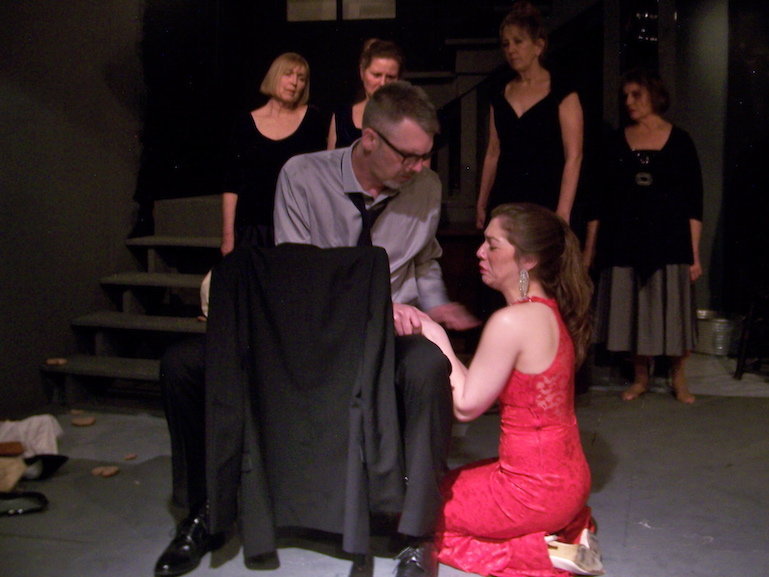The men are off to war; the women are left to weep. It has always been thus, women left behind while their men roar off to the manliest and most heroic of tasks, battle.
Unless, of course, you happen to be among the "Women of Troy," the translation of the 2,000-year-old play getting a new life under Dale Gutzman’s direction at Off the Wall Theatre. These women, while full of sorrow, are also full of determination to both accept and battle what the fates have given to them.
The original play, written in 451 B.C. by Euripides, is a tale from the time of the famed Trojan Horse and the sacking of the city of Troy by Greek warriors. Gutzman, however, has set his play in the jazz age, and the earliest moments let us know that we have entered a world where all is clearly not what it seems.
Five women enter the stage, dressed in black evening gowns and bejeweled with glitter from their ears, necks and fingers. While these women (known as the Chorus) are dressed for delight, their souls have already been ransacked by the horror of the war that has claimed their men, their children and their city.
The most moving moment of the entire night comes when the music plays and the women, used to dancing happily with their men, dance empty-armed and sad. The moment is brief, but it says almost all that ever needs to be said about battle.
The women have been stamped with a branding iron and assigned to various conquering Greek officers, waiting to be shipped to fates that are uncertain and feared.
Standing in the middle of this chattel is Hecuba (Marilyn White), the queen who has seen her family driven to death and madness. She has a regal clarity befitting a queen but is torn by the death and destruction of everything she has held dear.
It is mainly through Hecuba that we get to see war and its horrors through the eyes of a woman. For most of history, it is the men who fought the wars and the men who described what happened in war. This production gives women the chance to tell the story of war, and as Hecuba laments, "War and rape are siblings, are they not?"
What awaits these women is a degradation that only adds to the impassioned sense of dread that drapes the women of Troy like a shroud. They are left bereft of anything that resembles hope, and things only get worse when Andromache (Laura Monagle), the daughter-in-law of Hecuba, arrives with her infant son.
In just a matter of moments, a conflicted Talthybius (Randall T. Anderson) arrives to announce that the conquering generals have determined that the child is to be taken from his mother and killed. Anderson is clear that this is a task he is carrying out against his better nature.
The tragedy moves along a rocky road until we finally meet Helen of Troy (Zoe Schwartz), who has betrayed her husband as well as the women and is at the heart of the war that has destroyed the world. Her husband (James Strange) arrives promising to kill his wandering wife, but in the end, is seduced into forgiveness by her passionate pleas and her sultry beauty.
In the end, the women are led off to the ships awaiting them, taking them to a fate worse than death. All but Hecuba.
She is determined to go down with her homeland and marches bravely off to the flames of the inferno burning all of Troy to the ground. She has described herself as "a tottering old wreck," and Andromache said she "has a face grown old by suffering." But a smile graces her lips as she leaves behind her prison and walks proudly into her death. It is an unbearably brave act.
White is an absolute powerhouse on this stage. Every fiber of her body screams of the pain that engulfs her. She is an actor who understands the subtleties of acting in a small space. With a glance or a small gesture, she often says more than could be said with a full page of dialogue.
Monagle, too, delivers a bravura performance. The moment when her child is condemned to death is fraught with a prolonged wail as she gazes into a face that she will never see again. It’s a moment played for all it’s worth, and it hits home.
When Gutzman stages a big cast show – there are 13 in this cast – he gets uneven performances from some actors. But the grace and power of this story, seeing the world of men through the eyes of women, carries the day.
"Women of Troy" runs through Feb. 26 and information on showtimes and tickets is available here.
With a history in Milwaukee stretching back decades, Dave tries to bring a unique perspective to his writing, whether it's sports, politics, theater or any other issue.
He's seen Milwaukee grow, suffer pangs of growth, strive for success and has been involved in many efforts to both shape and re-shape the city. He's a happy man, now that he's quit playing golf, and enjoys music, his children and grandchildren and the myriad of sports in this state. He loves great food and hates bullies and people who think they are smarter than everyone else.
This whole Internet thing continues to baffle him, but he's willing to play the game as long as OnMilwaukee.com keeps lending him a helping hand. He is constantly amazed that just a few dedicated people can provide so much news and information to a hungry public.
Despite some opinions to the contrary, Dave likes most stuff. But he is a skeptic who constantly wonders about the world around him. So many questions, so few answers.







